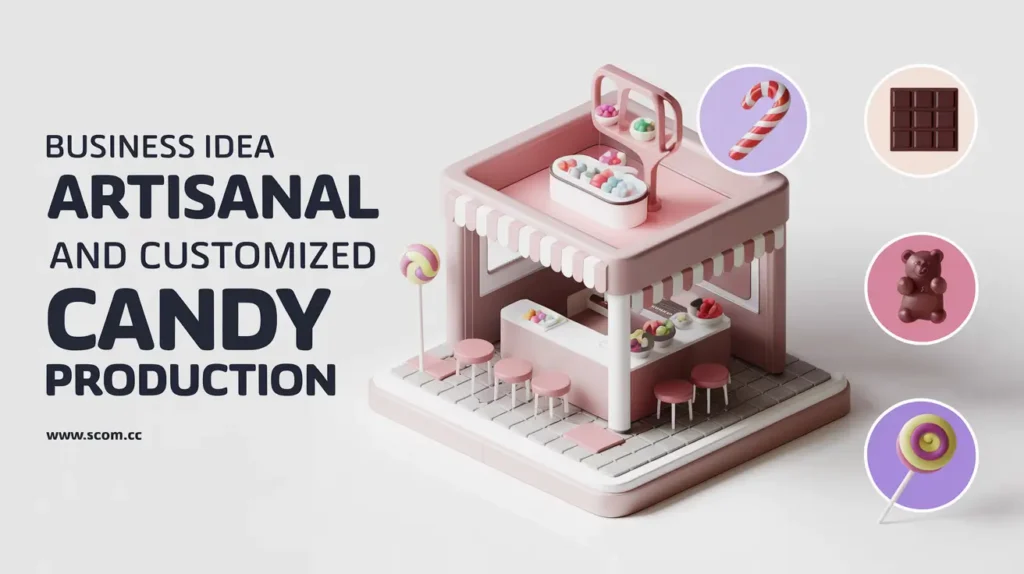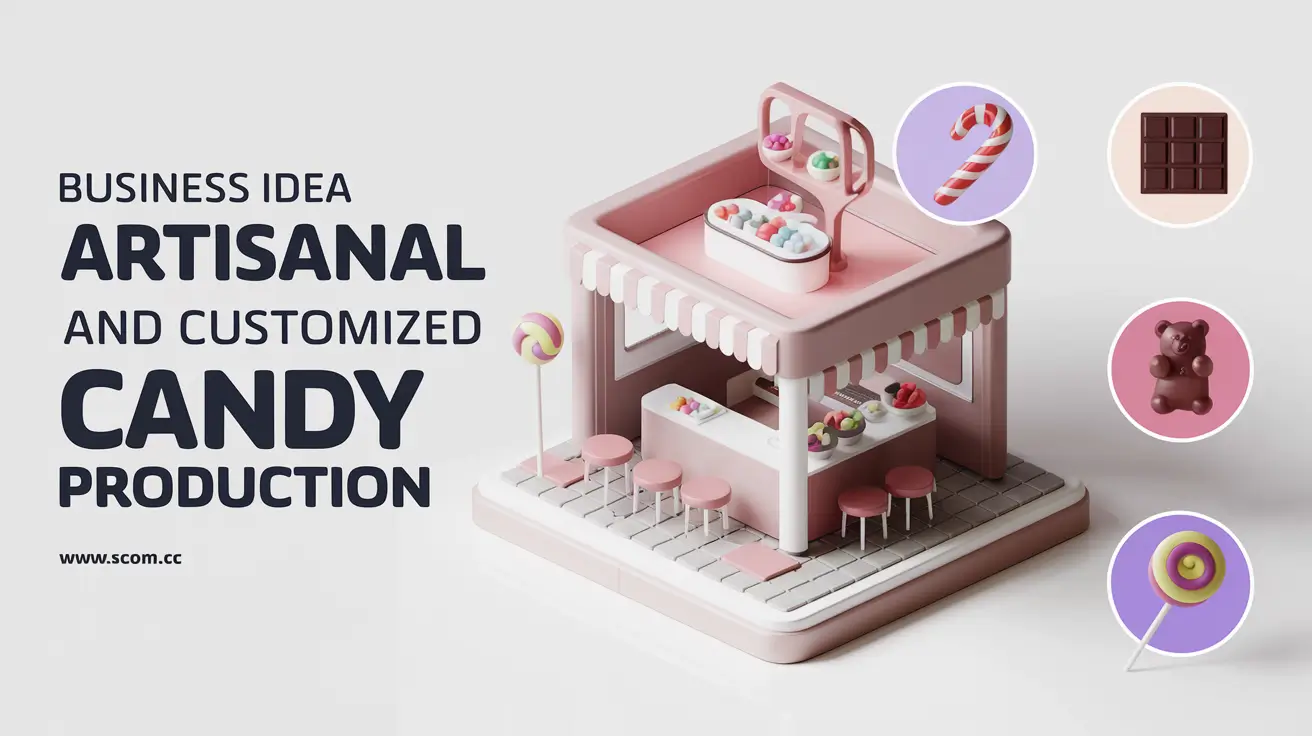Business Idea Artisanal and Customized Candy Production

- Business Idea Artisanal and Customized Candy Production
- Introduction to Artisanal and Customized Candy Production
- What Is Artisanal and Customized Candy Production?
- Market Potential for Artisanal Candy Production
- Initial Costs and Investment
- Benefits of Artisanal and Customized Candy Production
- Challenges and Considerations
- Legal and Regulatory Aspects
- Marketing and Placement Strategies
- Future Trends and Innovations
- Conclusion
- Summary Table
-
FAQ
- What is artisanal and customized candy production?
- What are the target markets for artisanal candy production?
- What are the initial costs for starting an artisanal candy production business?
- What are the main benefits of artisanal and customized candy production?
- What challenges might businesses face in artisanal candy production?
- What legal and regulatory aspects should be considered?
- How can businesses effectively market artisanal candy products?
Business Idea Artisanal and Customized Candy Production
Artisanal and Customized Candy Production: Crafting Unique Confections for Shops and Events
Offer a candy production line with various flavors and shapes, providing artisanal and customized products for shops and events.
Introduction to Artisanal and Customized Candy Production
Artisanal and customized candy production is an innovative approach to creating unique, high-quality confections tailored to individual preferences and occasions. This business model combines traditional candy-making techniques with modern customization options, offering bespoke products for shops, events, and personal celebrations. This guide explores the concept of artisanal candy production, including its market potential, benefits, costs, and key considerations for starting a successful candy-making business.
What Is Artisanal and Customized Candy Production?
Artisanal and customized candy production involves creating candies with a focus on high-quality ingredients, unique flavors, and personalized designs. This approach contrasts with mass-produced candies, emphasizing craftsmanship, creativity, and customer preferences.
Key Features
- Unique Flavors: Offers a variety of flavors, including seasonal and exotic options.
- Custom Shapes and Designs: Ability to create candies in various shapes, sizes, and designs.
- High-Quality Ingredients: Uses premium ingredients to enhance taste and texture.
- Personalization: Customization for special events, gifts, and shop displays.
Market Potential for Artisanal Candy Production
The artisanal and customized candy market is expanding as consumers seek unique and high-quality confectionery options. This market caters to a range of needs, from personal celebrations to corporate events, offering significant opportunities for growth.
Target Markets
- Retail Shops: Specialty stores and boutiques that sell unique and high-quality candies.
- Events and Celebrations: Weddings, parties, and corporate events requiring customized candy favors.
- Gourmet Food Stores: Shops focusing on artisanal and gourmet food products.
- Online Retailers: E-commerce platforms offering customized candy options.
Initial Costs and Investment
Starting an artisanal and customized candy production business involves various initial costs, including equipment, ingredients, and marketing. Proper budgeting is essential for a successful launch and operation.
Cost Breakdown
- Equipment: Costs for candy-making machinery, molds, and packaging materials, typically ranging from $5,000 to $20,000.
- Ingredients: Expenses for high-quality ingredients, including sugars, flavorings, and other additives.
- Setup and Production: Includes costs for setting up the production facility, such as rent, utilities, and initial inventory.
- Marketing: Budget for branding, packaging design, and promotional activities.
Benefits of Artisanal and Customized Candy Production
Artisanal and customized candy production offers numerous benefits, setting it apart from traditional candy-making. These advantages include enhanced customer appeal, creativity, and market differentiation.
Advantages
- High-Quality Products: Emphasis on premium ingredients and craftsmanship results in superior confections.
- Unique Offerings: Custom shapes and flavors attract customers seeking something special.
- Flexibility: Ability to quickly adapt to market trends and customer preferences.
- Brand Differentiation: Distinguishes the business from mass-produced candy brands.
Challenges and Considerations
While artisanal candy production offers significant benefits, there are challenges to address. Proper planning and management are essential to overcome these obstacles and ensure a successful operation.
Common Challenges
- High Production Costs: Premium ingredients and specialized equipment can lead to higher production costs.
- Market Competition: Competing with established candy brands and other artisanal producers.
- Regulatory Compliance: Adhering to food safety and labeling regulations.
- Scaling Production: Managing production volume to meet demand while maintaining quality.
Legal and Regulatory Aspects
Operating an artisanal candy production business involves adhering to various legal and regulatory requirements. Compliance ensures the safety and quality of the products and protects the business from potential issues.
Key Regulations
- Food Safety: Compliance with local and national food safety regulations, including hygiene and sanitation standards.
- Labeling Requirements: Accurate labeling of ingredients, nutritional information, and allergen warnings.
- Business Licenses: Obtaining necessary permits and licenses for food production and sales.
- Health and Safety: Ensuring workplace safety standards are met for employees involved in production.
Marketing and Placement Strategies
Effective marketing and strategic placement are crucial for promoting artisanal and customized candy production. Developing a strong brand identity and reaching the target audience are key to attracting and retaining customers.
Marketing Tips
- Emphasize Quality and Craftsmanship: Highlight the artisanal nature of the products and the use of high-quality ingredients.
- Leverage Customization: Promote the ability to create personalized candies for various occasions.
- Showcase Products: Use visually appealing packaging and product displays to attract customers.
- Utilize Social Media and Online Platforms: Engage with potential customers through social media, e-commerce sites, and online advertising.
Future Trends and Innovations
The artisanal candy industry is evolving with new trends and innovations. Staying informed about these developments can provide businesses with a competitive edge and help them adapt to changing consumer preferences.
Emerging Trends
- Health-Conscious Options: Introduction of candies with reduced sugar, natural sweeteners, and organic ingredients.
- Sustainable Practices: Adoption of eco-friendly packaging and sustainable production methods.
- Interactive Experiences: Offering customers the opportunity to participate in candy-making workshops or create their own custom candies.
- Technology Integration: Use of technology for inventory management, online orders, and customer engagement.
Conclusion
Artisanal and customized candy production presents a unique opportunity to create high-quality, personalized confections that stand out in the marketplace. By understanding the market potential, managing initial costs, and addressing challenges, entrepreneurs can successfully establish and grow a candy production business. With a focus on innovation, quality, and effective marketing, this business model can meet the growing demand for distinctive and bespoke candy products.
Summary Table
| Aspect | Details |
|---|---|
| Product | Artisanal and customized candy production |
| Key Features | Unique flavors, custom shapes and designs, high-quality ingredients, personalization |
| Target Markets | Retail shops, events and celebrations, gourmet food stores, online retailers |
| Initial Costs | $5,000 to $20,000 for equipment, plus ingredients, setup, production, and marketing expenses |
| Benefits | High-quality products, unique offerings, flexibility, brand differentiation |
| Challenges | High production costs, market competition, regulatory compliance, scaling production |
| Legal Requirements | Food safety, labeling requirements, business licenses, health and safety standards |
| Marketing Strategies | Emphasize quality and craftsmanship, leverage customization, showcase products, utilize social media and online platforms |
| Future Trends | Health-conscious options, sustainable practices, interactive experiences, technology integration |
FAQ
What is artisanal and customized candy production?
Artisanal and customized candy production involves creating high-quality candies with unique flavors, shapes, and designs tailored to individual preferences and occasions.
What are the target markets for artisanal candy production?
Target markets include retail shops, events and celebrations, gourmet food stores, and online retailers.
What are the initial costs for starting an artisanal candy production business?
Initial costs include $5,000 to $20,000 for equipment, plus expenses for ingredients, setup, production, and marketing.
What are the main benefits of artisanal and customized candy production?
Benefits include high-quality products, unique offerings, flexibility, and brand differentiation.
What challenges might businesses face in artisanal candy production?
Challenges include high production costs, market competition, regulatory compliance, and scaling production while maintaining quality.
What legal and regulatory aspects should be considered?
Businesses must adhere to food safety regulations, accurate labeling, obtain necessary licenses, and ensure health and safety standards.
How can businesses effectively market artisanal candy products?
Effective marketing strategies include emphasizing quality and craftsmanship, leveraging customization, showcasing products, and utilizing social media and online platforms.

If you enjoyed this article and found it valuable, we encourage you to explore our news and valuable information section, where you'll find more relevant and up-to-date content that may pique your interest. Additionally, if you are seeking advice or need guidance on a specific topic, we suggest visiting our services section. There, you will find a variety of options designed to assist and support you in addressing your needs. Feel free to check out both sections to get the information and assistance that best suits your requirements.

Leave a Reply